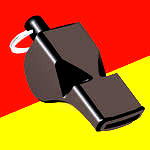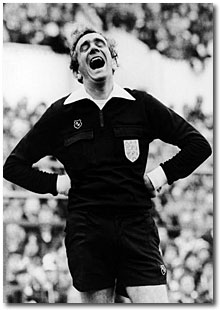| |
 |
WHOSE GAME IS IT ANYWAY?
"The greater the power, the more dangerous the abuse!!!"
Bob Evans, Ph.D.
Principal Instructor 2002 Ken Aston Referee Camp
Former USSF National Director of Instruction
Former FIFA Referee, National Instructor, National Assessor
Published Author of... "For the Good of the Game"
For the Integrity of Soccer - Art and Science of Refereeing ~
BLOG
 |
Biography
I emigrated from Wales and England in 1963, stayed in Nova Scotia for two years, then went to the University of Kansas to work towards a Ph.D. in Geology.
In 1969, after playing both soccer and rugby at KU, I moved to Dallas, Texas to work in a geological research laboratory. I figured that my soccer career was over. Hah!
Little did I know that senior soccer had been played in Dallas for a long time, and in the late sixties, when I arrived, youth soccer was beginning to grow as a sport. Within a week or two I was
practicing with the German-American club, the local league champions, and not long afterwards, I was asked if I would like to coach the team.
This was not a difficult task, since the club had some very fine, if aging, players, and we won both the league and the cup for 1969-70.
I had first qualified as a Referee in 1964, while recuperating from a broken leg incurred in the Nova Scotia senior league.
In Dallas I started Refereeing again, in youth and senior soccer.
By the early seventies, the fledgling North American Soccer League was expanding and looking for more officials, so I threw my hat in the ring.
By any decent standards I was unprepared to officiate professional soccer.
In fact, the first time I ever ran line was in a professional game!
But I learned fast and in my second season in the NASL, I was put in the middle of an exhibition match between Dallas and Monterrey of Mexico.
A league match came my way shortly afterwards, and I stayed as a Referee in the NASL until it folded in 1984.
I joined the International Panel in 1979, retired one year early to take over as National Director of Referee Instruction in 1988,
and started the National Testing sessions by taking up on the idea put forward by my predecessor Bob Sumpter.
In the meantime, I had a full research career as a geologist, but decided to change direction in 1996.
The notion of writing had been whispering in my ear for several years, and when it became clear that my employer was giving up on pure research,
I decided to leave to give it a try.
I went back to school (at the University of California at Santa Cruz for 1996-97), took an intern-ship in Idaho for eight or nine months,
and have been freelancing ever since, from our home in California.
Readers will notice as this site progresses, that I will make reference to aspects of my life besides soccer.
I will occasionally put something up about science, including geology, which still holds me captive, and about writing, be it about scientific or other themes.
Science is more than a subject at school; it is a way of thought, a way of facing the world, and I have to say that it has permeated my life.
Even in the world of soccer, science has its place, and so research into various aspects of the game and refereeing will appear on this site from time to time.
If you are interested in Good Refereeing, Good Science, Good Writing, then enjoy, your journey here on... KenAston.org, as you wish.
|
A wise man (George Santayana) once said that if we do
not learn from history, we are condemned to repeat it. So in my delving
into history, I came across the name of Edmund Burke (1729-1797). He was
notable as a great orator, whose voice thundered across England, during
times of great upheaval… (During) both the American and French
Revolutions.
But he was also notable to us, because he was one of the few (in the
British Parliament)…to support the American colonies, in their
disagreements with England and King George III. For Burke was concerned
about POWER…He said in a speech in 1771, "The greater the
Power, the
more dangerous the abuse." And that brings me to the subject of
Referees.
The Laws of the Game give the Referee great powers…for two hours or
so...the Referee is the powerful Captain of the ship, the only
Policeman, the Judge, Jury and Executioner, of any party … Therein lies
the problem, for people like power, and in their affection for it, they
abuse it. Burke was right…. The abuse IS all the more
dangerous because the power IS so great.
Consider some examples, A Referee goes to caution a player, after a
foul. The player understandably upset asks the official, "What am I
being cautioned for?"
The Referee answers, "For being stupid enough to commit a foul like
that."
THERE was an abuse of power. The Referee must inform
the player of the reason for the caution, but does not have the right to
insult him, at the same time. After all, what would happen to a player,
if he told the Referee that his decisions were stupid?
Another example. At a break in a game, (for) injury, a coach asked the
Referee… "’Excuse me Ref, but can I ask you about the decisions at the
indirect free kick a moment ago?"
Back comes the response; "I don’t have to explain anything to you! If
you don’t like the decision, that’s too bad! And if you talk to me
again, you’re out of the game!" There was an abuse of power.
The laws do not allow dissent from players or club officials, but surely
we can answer questions, that are politely put.
The problem with both of these Referees is that they are forgetting
whose game this is. The game is for the players, and it is the Referee’s
duty to ensure that all players get the maximum enjoyment, out of
playing in a match.
The Referee protects them from physical attack; he ensures that their
opponents do not cheat them; he creates an environment in which a
sporting contest can be fairly conducted. The Referee is 'NOT'
a dictator. He (or she) cannot expect the players to bow down to his (or
her) will, simply because he (or she) is there.
So here we have some do’s and don’ts for the Referees:
 1.
When taking disciplinary action …say no more than the law requires:
"This is a caution (Yellow Card) for unsporting behavior…If you commit
another like that, I may have to ask you to leave the field."
1.
When taking disciplinary action …say no more than the law requires:
"This is a caution (Yellow Card) for unsporting behavior…If you commit
another like that, I may have to ask you to leave the field."
If anything more needs to be said, do not get into an argument. Never
insult a player. Let the player have the last word of disagreement. Then
remove yourself from the discussion.
 2.
Learn not to be too sensitive to disagreement about decisions you make.
The players will not agree …all the time…the fact is you make mistakes!
WE all do. We must simply learn to live with them and try to improve, in
the next game.
2.
Learn not to be too sensitive to disagreement about decisions you make.
The players will not agree …all the time…the fact is you make mistakes!
WE all do. We must simply learn to live with them and try to improve, in
the next game.
When someone makes a sly comment of disagreement, a suitable response
may be,: "Well you may be right, it might have been the other way, but
we’ll live with it the way it is." After all, when someone disagrees
with you, they are not attacking the very soul of your being…you do not
need to over-react.
 3.
Set a pleasant atmosphere… a technique that works for me is to seek out
the coaches before the game and introduce myself. With a smile I may say
something like this: ’Well it’s a lovely day for a game, and I’m really
looking forward to doing this one. I hope your players enjoy
themselves." AND I never give threatening speeches to the captains at
the coin toss. All that is necessary is … a few words and "good luck to
you both."
3.
Set a pleasant atmosphere… a technique that works for me is to seek out
the coaches before the game and introduce myself. With a smile I may say
something like this: ’Well it’s a lovely day for a game, and I’m really
looking forward to doing this one. I hope your players enjoy
themselves." AND I never give threatening speeches to the captains at
the coin toss. All that is necessary is … a few words and "good luck to
you both."
 4. If you have had a major disagreement with some players or with a
particular club, stay away from them for a while. Give hard feelings a
chance to soften. You are not a tougher Referee when you go straight
back… with teams you have had problems with:
you are an unwise one.
4. If you have had a major disagreement with some players or with a
particular club, stay away from them for a while. Give hard feelings a
chance to soften. You are not a tougher Referee when you go straight
back… with teams you have had problems with:
you are an unwise one.
You are forgetting that the players have the right to a pleasant game….
If you’re being there creates the wrong atmosphere, even before kick
off… YOU are the one who must give way. The players are more important
than the Referee is. There will always be other games.
Underlying this discussion is a disturbing thought…" Those who have been
once intoxicated with power, can never willingly abandon it" (Edmund
Burke).
Burke understood that, because he was writing about the colonial
government, in its dealings with the American revolutionaries. But we
know too, because we can all think of Referees who will not change their
dictatorial and harsh ways.

But the great hope, in writing about this, is that we can reach
Referees, who may be wise enough to change their ways, for the benefit
of the players-whose game this is. And if they will not, then the game
may have to get along without them.
 Reactions Welcome... cymro@mcn.org
Reactions Welcome... cymro@mcn.org
|